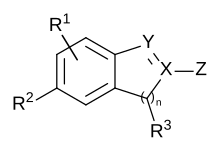براءة اختراع كيميائية - ويكيبيديا
| قانون براءات الاختراع |
|---|
| لمحات عامة |
| مفاهيم إجرائية |
| متطلبات الحصول على براءة الاختراع والمفاهيم ذات الصلة |
| متطلبات قانونية أخرى |
| حسب المنطقة / الدولة |
| مواضيع محددة |
| طالع أيضاً |

براءة اختراع كيميائية أو براءة اختراع دوائية هي براءة اختراع لاختراع في صناعة المواد الكيميائية أو المستحضرات الصيدلانية. بالمعنى الدقيق للكلمة، في معظم الولايات القضائية، لا توجد اختلافات جوهرية بين المتطلبات القانونية للحصول على براءة اختراع لاختراع في المجالات الكيميائية أو الصيدلانية، مقارنة بالحصول على براءة اختراع في المجالات الأخرى، مثل المجال الميكانيكي. وبالتالي، فإن براءة الاختراع الكيميائية أو براءة الاختراع الصيدلانية ليست حقًا فريدًا، أي نوع قانوني خاص من براءات الاختراع.
في صناعة المستحضرات الصيدلانية، تُمنح حماية براءات الاختراع للأدوية والأدوية أهمية خاصة، لأنه يمكن نسخ الأدوية والأدوية بسهولة أو تقليدها (عن طريق تحليل مادة دوائية) وبسبب الإنفاق الكبير على البحث والتطوير والمخاطر العالية المرتبطة به. تطوير عقار جديد.[1][2][3]
تختلف براءات الاختراع الكيميائية عن المصادر الأخرى للمعلومات التقنية بسبب هياكل ماركوش العامة الموجودة فيها، والتي سميت على اسم المخترع يوجين ماركوش الذي فاز بمطالبة في الولايات المتحدة في عام 1925 للسماح باستخدام مثل هذه الهياكل في مطالبات براءات الاختراع. تُستخدم هذه الهياكل العامة لجعل مطالبة البراءة واسعة بقدر الإمكان.
في الولايات المتحدة، كانت براءات الاختراع على المستحضرات الصيدلانية تعتبر غير أخلاقية من قبل مهنة الطب خلال معظم القرن التاسع عشر.[4] تم تمديد شروط براءات اختراع الأدوية في الولايات المتحدة من 17 إلى 20 عامًا في عام 1994.[5]
انظر أيضًا
[عدل]المراجع
[عدل]- ^ Oliver Gassmann, Gerrit Reepmeyer, Maximilian von Zedtwitz, Leading Pharmaceutical Innovation, Trends and Drivers for Growth in the Pharmaceutical Industry, Springer, 2008, (ردمك 3-540-77635-4), (ردمك 978-3-540-77635-2), pages 133-134.
- ^ Scherer FM., The economics of human gene patents نسخة محفوظة April 25, 2012, على موقع واي باك مشين., Acad Med. 2002 Dec;77(12 Pt 2):1348-67 : "
- For one, in pharmaceuticals, as in organic and agricultural chemicals, patent claims tend to define products especially precisely. ...
- Second, once a particular molecule is identified as a potentially effective therapeutic medium, it must be carried through expensive clinical trials to prove its safety and efficacy. ...
- Third, absent patent protection or regulatory barriers to imitation, imitators might spend a very few million dollars on product formulation, process development, and clinical trials (typically on 24 human subjects) required to prove therapeutic equivalence and bring their generic substitutes onto the market in competition with the company that has incurred huge discovery and clinical testing costs. ...
- ^ "... patents are key in the pharmaceutical sector, as they allow companies to recoup their often very considerable investments and to be rewarded for their innovative efforts" in European Commission, Pharmaceutical Sector Inquiry, Preliminary Report (DG Competition Staff Working Paper), 28 November 2008, page 5 (pdf, 1.95 MB). نسخة محفوظة 2020-08-26 على موقع واي باك مشين.
- ^ Gabriel، Joseph (2014). Medical Monopoly: Intellectual Property and the Origins of the Modern Pharmaceutical Industry. University of Chicago Press. ISBN:9780226108186.
- ^ "Milestones in U.S. Food and Drug Law History". U.S. Food and Drug Administration. مؤرشف من الأصل في 2020-08-26. اطلع عليه بتاريخ 2019-08-11.
قراءة متعمقة
[عدل]- European Commission, Pharmaceuticals, Sector Inquiry, 2008 (Public Consultation, Preliminary Report).
- "Patents and Pharmaceuticals", a paper given on 29 November 2008 at the Presentation of the Directorate-General of Competition's Preliminary Report of the Pharma-sector inquiry, by the Rt. Hon. Sir Robin Jacob
- India wins landmark patent battle, BBC News, March 9, 2005
- "HIV/AIDS, Patents and the TRIPS Agreement: Issues and Options", United States Congressional Research Service, July 27, 2001
- "Pharmaceutical Patent Term Extensions: A Brief Explanation", United States Congressional Research Service, January 31, 2002
مصادر خارجية
[عدل]- Patent Opposition Database, an online resource launched by Doctors without Borders as "a tool which can be used to explore how to challenge unfair patents and their negative impact on access to medicines." ("About". Patent Opposition Database. MSF Access Campaign. مؤرشف من الأصل في 2012-10-07. اطلع عليه بتاريخ 2012-10-13.)


 French
French Deutsch
Deutsch